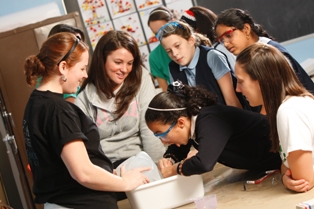"Great moments are born from great opportunity." - Herb BrooksIt's been an incredible week. Every week seems pretty incredible since I switched jobs this year from being a 5th grade teacher to a Curriculum Support Coach. I still often miss having my own class and being able to act on moments of serendipity without having to convince someone to let me borrow their students, but it's exciting to have the job of helping teachers and students do awesome things every day.
This week was exceedingly incredible, though. First, I was able to work out the details with our local newspaper, The News Eagle, to allow our 5th grade students to start writing blog posts for their website. The paper was looking for the perspectives of students in the area, read the blog posts our students have been writing, and asked if we could partner up. There's no better way for our students to learn to write than to actually be journalists, so we were happy to accept.
Next, after about a month of research and planning, the our 5th grade students put on their first US History Living Wax Museum. Each student researched a figure from early American History, wrote a monologue in the first person, and came up with a costume that was as historically accurate as possible. We invited younger students and community members. Each student stood or sat frozen until "activated" by a visitor. They then came to life and delivered their monologue before freezing again. It was a whole lot of fun, our students learned a great deal, and the comments from our visitors were overwhelmingly positive.
The most exciting thing about this week is the launch of an fantastic global collaboration project that I have been lucky enough to be working on with three absolutely amazing teachers from across the country. A few weeks ago Dyane Smokorowski, Andrea Keller, and Karen Wright-Balbier contacted me and asked if I'd be interested in collaborating on a project intended to connect classrooms.
One of the great things about being a networked educator is the inspiration that comes from seeing the things that others do with their students. Having been connected to these teachers for years, I was so excited and humbled that they thought of me to help out with this.
Our intention is to connect regular ed, special ed, special needs, and mainstreamed classrooms across North America so that students can share their wishes for 2014 with each other. They'll do this by exchanging holiday cards and meeting face-to-face to share their wishes via videoconference.
I believe that school should be less about what you know and more about what you can do to make a difference. Instead of telling students to sit down and listen, we should be empowering them to stand up and facilitate the change they want to see in the world. Instead of complaining about what's wrong, I want my students to start becoming the members of society that make things right.
My hope is that this project is a way to help students start those conversations. If the four of us can assist teachers all over the world in helping their students share their wishes and dreams for the upcoming year, maybe those students and teachers can start making them come true.
To learn more about the 2014 Wishes Project, and to sign up, visit the website we created. You'll find information about the project, a map of classrooms that have already signed up, and possible extension opportunities. If connecting with other classrooms like this seems overwhelming to you, don't worry. We're going to help you with whatever you need to make this successful.
I opened this post with a quote from Herb Brooks, a hockey coach most famous for guiding the 1980 USA Olympic team to the gold medal in the Lake Placid Olympics. Great moments are born from great opportunity. I know what an amazing opportunity this is for our students. I can't wait to see the moments yet to come. I hope you'll join us.






